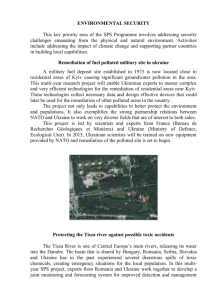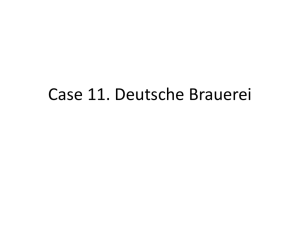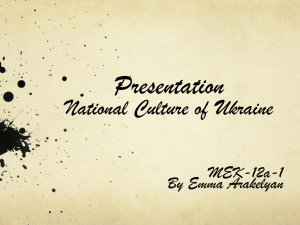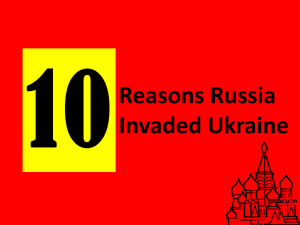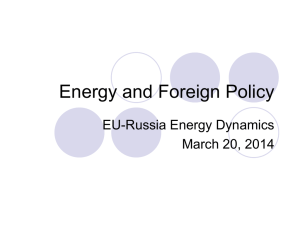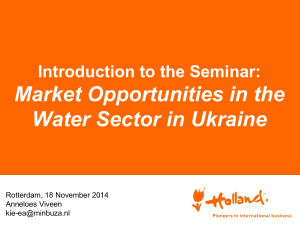EURASIA CENTER`s PROPOSAL FOR SOLVING THE CRISIS
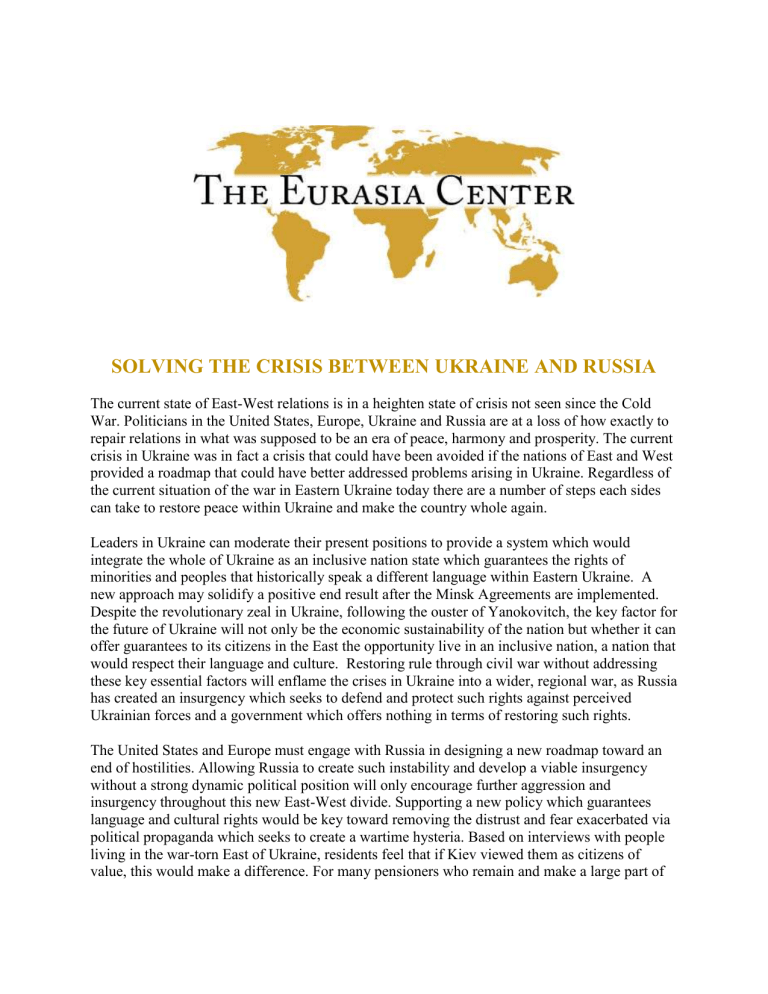
SOLVING THE CRISIS BETWEEN UKRAINE AND RUSSIA
The current state of East-West relations is in a heighten state of crisis not seen since the Cold
War. Politicians in the United States, Europe, Ukraine and Russia are at a loss of how exactly to repair relations in what was supposed to be an era of peace, harmony and prosperity. The current crisis in Ukraine was in fact a crisis that could have been avoided if the nations of East and West provided a roadmap that could have better addressed problems arising in Ukraine. Regardless of the current situation of the war in Eastern Ukraine today there are a number of steps each sides can take to restore peace within Ukraine and make the country whole again.
Leaders in Ukraine can moderate their present positions to provide a system which would integrate the whole of Ukraine as an inclusive nation state which guarantees the rights of minorities and peoples that historically speak a different language within Eastern Ukraine. A new approach may solidify a positive end result after the Minsk Agreements are implemented.
Despite the revolutionary zeal in Ukraine, following the ouster of Yanokovitch, the key factor for the future of Ukraine will not only be the economic sustainability of the nation but whether it can offer guarantees to its citizens in the East the opportunity live in an inclusive nation, a nation that would respect their language and culture. Restoring rule through civil war without addressing these key essential factors will enflame the crises in Ukraine into a wider, regional war, as Russia has created an insurgency which seeks to defend and protect such rights against perceived
Ukrainian forces and a government which offers nothing in terms of restoring such rights.
The United States and Europe must engage with Russia in designing a new roadmap toward an end of hostilities. Allowing Russia to create such instability and develop a viable insurgency without a strong dynamic political position will only encourage further aggression and insurgency throughout this new East-West divide. Supporting a new policy which guarantees language and cultural rights would be key toward removing the distrust and fear exacerbated via political propaganda which seeks to create a wartime hysteria. Based on interviews with people living in the war-torn East of Ukraine, residents feel that if Kiev viewed them as citizens of value, this would make a difference. For many pensioners who remain and make a large part of
the population, the dream of receiving Russian pensions is over and many are disillusioned with the separatists.
On the economic front, a great possibility for Ukraine would be for it to be declared a free trade zone by both East and West. Its economic situation would be improved dramatically if the East and the West would allow it to be a bridge towards economic development rather than economic strife and chaos. Clearly, the concept of Ukraine as a free trade zone would be beneficial for
Ukrainians, Europeans and Russians. However, structuring this new economic status would be a key priority for officials who can recognize this as an important step out of the current crisis and an important resolution for the Russians who perceive their economic viability as being threatened.
If Ukraine was able to provide an inclusive policy to its citizens in the East, this would remove huge barriers of mistrust and misperceptions that undercut Russia’s position in the East. Once an official position was set, where citizens in the east of Ukraine could feel part of a nation that would embrace their rights, then all other forms of integration and collaboration would be possible. Without a basic plan to offer citizens in the East to part of a united Ukraine again, there would be no hope for integrating these regions back within Ukraine except through military victory and the defeat of the Russian insurgency. Removal of the very basis of Russian propaganda in Ukraine, would be to promote a new policy of inclusion and cooperation with the citizens in the East, with an explanation of what benefits are possible if a cessation of fighting occurs and Ukrainian authority is accepted in the Donbass and Luhansk regions for ordinary citizens.
Russia, for its part, must understand that with the current economic crisis, it may only face economic dislocation and disaster if it continues on a course of not only supporting an insurgency but creating one which brings no value for itself in future world economic and political developments. To create such situations in eastern Ukraine and then blame Ukraine and the West for this civil war begins a chapter in world events which may only end in catastrophic consequences for Russia. There is still time left to reverse this course and devise a strategy in which Russian objectives are acknowledged and respected and yet begin a new vector strategy which cultivates Ukraine as a new bridge towards peace and economic development and not the current course of destroying that bridge, that country, and severing political and economic relations with Europe and the United States.
The key for the Russian leadership must entail a sober detailed understanding that the only way for Ukraine to be that bridge of peace and prosperity once again, and to ensure its own economic sustainability, is to develop new strategies which must employ a new diplomatic framework which can create not only a new European regional security arrangement but also a new
Eurasian/European economic vision. This new vision must begin with the realization that
Ukraine not become a zone of death and destruction, as was the case in World War I and World
War II, but that this tragedy is averted through the creative genius of diplomacy and statesmanship which is necessary to avoid such a disaster. Naturally, the United States and
Europe are waiting for such an opportunity, however, to continue on a tangent towards a wider regional war can only bring wider devastation and disorder, the greatest tragedy being that this crisis can be avoided now with the proper diplomatic leadership promoting such steps.
First, The Eurasia Center proposes that Ukraine looks towards the model of many nations within the world that have regions of peoples who speak more than one language, have more than one historical narrative, yet share in and are a part of a sovereign nation state. Belgium, Switzerland and many other countries can serve as a model of development in which the rights of minority, be it language or heritage, are protected and inclusively integrated within the nation’s laws, with guarantees for future positive growth and development. Revenge and chauvinism will incur no willingness on the part of the citizens of the East to participate in a future Ukrainian state, whether in a federation or a region given autonomy if their basic rights of language and heritage are not protected and a strategy for inclusiveness included within a peace plan for the citizens of the East.
Second, based on the model of many states in which civil war, insurgency and economic dislocation have crippled nations, The Eurasia Center proposes that the United States, Europe and Russia consider the proposal that Ukraine become a free trade zone in which all nations can trade and invest to bring about greater collaboration and harmony of economies through this nation which can serve as an economic bridge between East and West. Economic, financial and trade ministers must build up this idea as a worthwhile solution to the current crisis in East-West relations, rather than drive Ukraine to accept membership into one trading bloc or another. As a gateway to both trading zones, enjoying the benefits of both, a brighter economic future for
Ukraine, East and West, would be ensured.
Thirdly, the model of alliances and the current security arrangement in Europe needs to be discussed at a Summit in which leaders from the United States, Russia and Europe and understand that the current course of political/military relations may evolve into a wider regional war, with the potential for a wider European or nuclear war, given the fact that there has been not only a greater stratification of forces, but a new engagement of forces from Russia and NATO within the region. Failure to act and resolve the growing conflict may only let the Ukrainian crisis escalate toward new levels of conflict, which both Europe and Russia have experienced within the last century. Summits among nations during crisis, seeking solutions rather than escalating toward war, are an important way of clearing any misperceptions and allowing a great understanding of positions vis-à-vis participants within summit process. Finally the removal of foreign forces and equipment from the East is necessary for Ukraine to be an integral whole again. Must ever village, town and city be converted into a new Stalingrad.
If the Russians do not honor the Minsk Agreements and continue steps towards destabilizing the territorial integrity and stability of Ukraine and its people, then it may be necessary for the West to support Ukraine sovereign right to defend itself. As Ukraine had relinquished the third largest nuclear weapons inventory for security guarantees of its borders from the United States, Russia
United Kingdom, France and China, 1994 Budapest Memorandum on Security Assurances,
Russia’s violation of this agreement may provide the United States with the right to provide military support for Ukraine’s independence.
Finally, if the leaders of the United States, Europe, Ukraine, and Russia cannot make progress concerning the current state of relations, it may be up to the citizens of these nations to apply pressure on officials to start considering these new steps for solving the current crisis, not only in
Ukraine, but in East-West relations, given the fact that failure to resolve the crises may not only destroy the economic prosperity of future generations within the global village of what we call the international community of nations but revert back to the days of tribalism, entangled alliances, and a nationalism which cripples peaceful solutions to current crisis in East-West relations boiling within the Ukraine.

